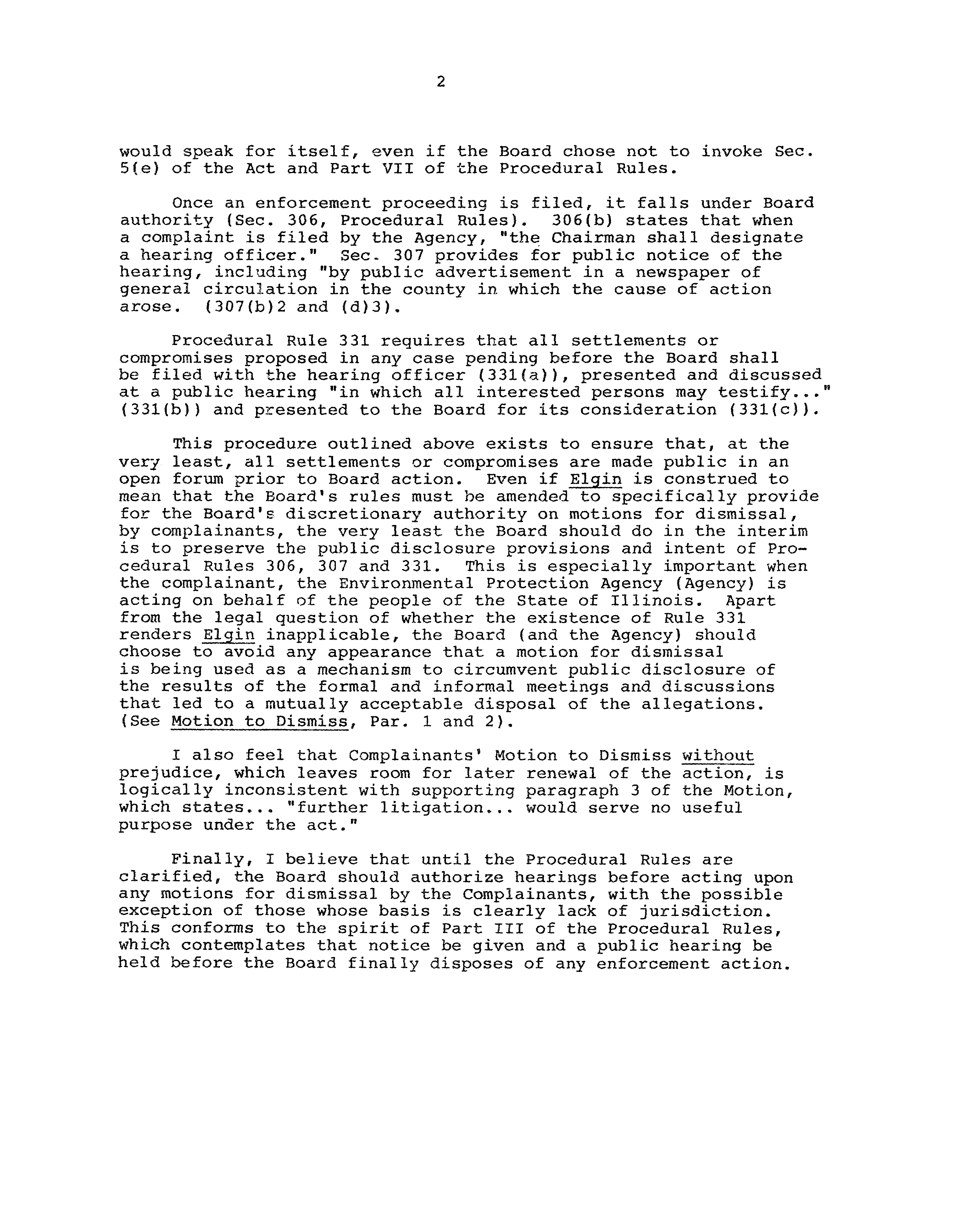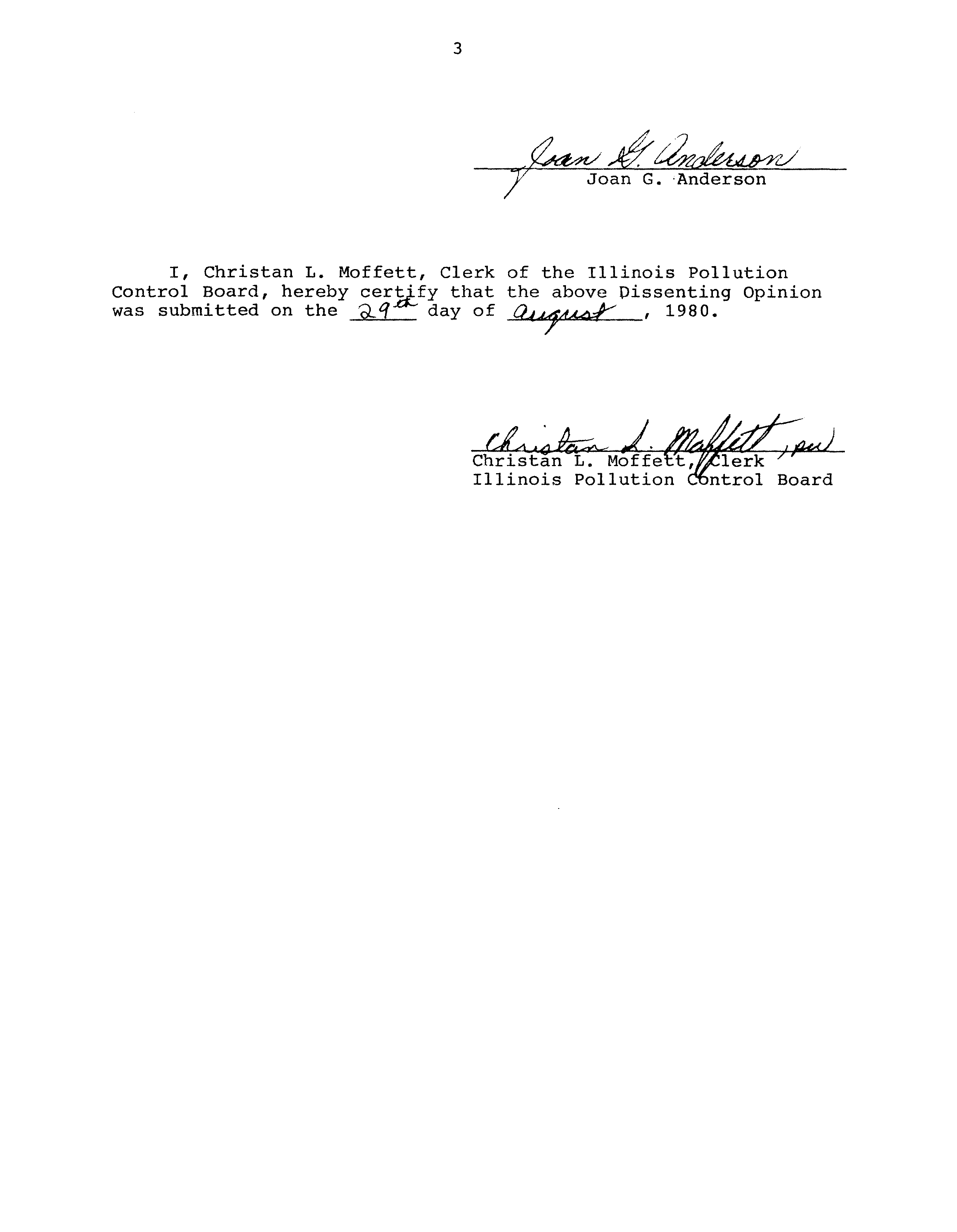ILLINOIS POLLUTION CONTROL BOARD
August 21,
1980
ENVIRONMENTAL PROTECTION AGENCY
and the PEOPLE OF THE STATE OF
)
ILLINOIS,
Complainants,
v.
)
PCB 78—54
AMOCO OIL COMPANY,
a Maryland
)
corporation, and AMOCO PIPELINE
COMPANY,
a Maine corporation,
)
Respondents.
DISSENTING OPINION
(by J.
Anderson):
This complaint was filed on February 27,
1978.
The complaint
alleges violations by the respondents of various provisions of the
Environmental Protection Act
(Act) and the Board’s rules and regu-
lations as a result of a pipeline rupture in December,
1977 that
caused xylene to be released.
On July 22, 1980, the Complainants
presented to the Board a Motion to Dismiss this action without
prejudice,
stating in part, that “the parties arrived at a mutually
acceptable manner of disposing of the matters alleged in the Com-
plaint”
(Par.
2)
and that “Complainants believe that further
litigation of this cause would serve no useful purpose under the
act”
(Par.
3).
On July 24,
1980, the Board ordered the complaint
dismissed with prejudice.
On August
7,
1980 the Complainants
filed a motion requesting reconsideration of the Board’s July 24,
1980 order.
In support of its motion,
the complainants argued
that they had an absolute right,
in the absence of any Board rules
to the contrary,
to have this cause dismissed as they submitted
it,
namely, without prejudice, citing Village of South Elgin,
et al.
v. Waste Management of Illinois,
Inc.,
et
ale.,
64 Ill.App.3d 565,
(2d Dist.
1978),
(Elgin).
On August 21,
1980, the Board reversed
itself and .provided for dismissal without prejudice.
I dissent in the Board’s reversal, because
I believe that the
Board should have corrected this matter by,
as a first step~ordering
a public hearing.
I see no reason why Elgin should be construed
as preventing the Board, while the case
is pending and prior acting
on the dismissal question,
from directing the hearing officer to
schedule a hearing to place under public scrutiny any compromise
or settlement,
specifically
in this case the substance of the
“mutually acceptable manner of disposing of the matters alleged
in the complaint.”
Concerns that the Complainants might fail to
appear at the hearing or fail to make a substantive record should
not deter the Board.
In such an unlikely event, such a record
2
would speak for itself, even if the Board chose not to invoke
Sec.
5(e) of the Act and Part VII of the Procedural Rules.
Once an enforcement proceeding is
filed,
it falls under Board
authority
(Sec.
306,
Procedural Rules).
306(b)
states that when
a complaint is filed by the Agency,
“the Chairman shall designate
a hearing officer.”
Sec.
307 provides for public notice of the
hearing, including
“by public advertisement in a newspaper of
general circulation in the county in which the cause of action
arose.
(307(b)2 and
(d)3).
Procedural Rule 331 requires that all settlements or
compromises proposed in any case pending before the Board shall
be filed with the hearing officer (331(a)), presented and discussed
at a public hearing “in which all interested persons may testify...”
(331(b)) and presented to the Board for its consideration (331(c)).
This procedure outlined above exists to ensure that,
at the
very least,
all settlements or compromises are made public in an
open forum prior to Board action.
Even if Elgin is construed to
mean that the Board’s rules must he amended to specifically provide
for the Board’s discretionary authority on motions for dismissal,
by complainants, the very least the Board should do in the interim
is to preserve the public disclosure provisions and intent of Pro-
cedural Rules
306,
307 and 331.
This is especially important when
the complainant, the Environmental Protection Agency (Agency)
is
acting on behalf of the people of the State of Illinois.
Apart
from the legal question of whether the existence of Rule 331
renders ~gin
inapplicable, the Board
(and the Agency)
should
choose to avoid any appearance that a motion for dismissal
is being used as a mechanism to circumvent public disclosure of
the results of the
formal and informal meetings and discussions
that led to a mutually acceptable disposal of the allegations.
(See Motion to Dismiss,
Par.
1 and 2).
I also feel that Complainants’ Motion to Dismiss without
prejudice, which leaves room for later renewal of the action, is
logically inconsistent with supporting paragraph
3 of the Motion,
which states...
“further litigation.., would serve no useful
purpose under the act.”
Finally,
I believe that until the Procedural
Rules are
clarified, the Board should authorize hearings before acting upon
any motions for dismissal by the Complainants, with the possible
exception of those whose basis
is clearly lack of jurisdiction.
This conforms to the spirit of Part III of the Procedural
Rules,
which contemplates that notice be given and a public hearing be
held before the Board finally disposes of any enforcement action.
3
7
Joan G. Anderson
I,
Christan
L.
Moffett,
Clerk of the Illinois Pollution
Control Board, hereby cer~fythat the above Dissenting Opinion
was submitted on the
pg
day of
____________,
1980.
~
Illinois Pollution
ntrol Board



